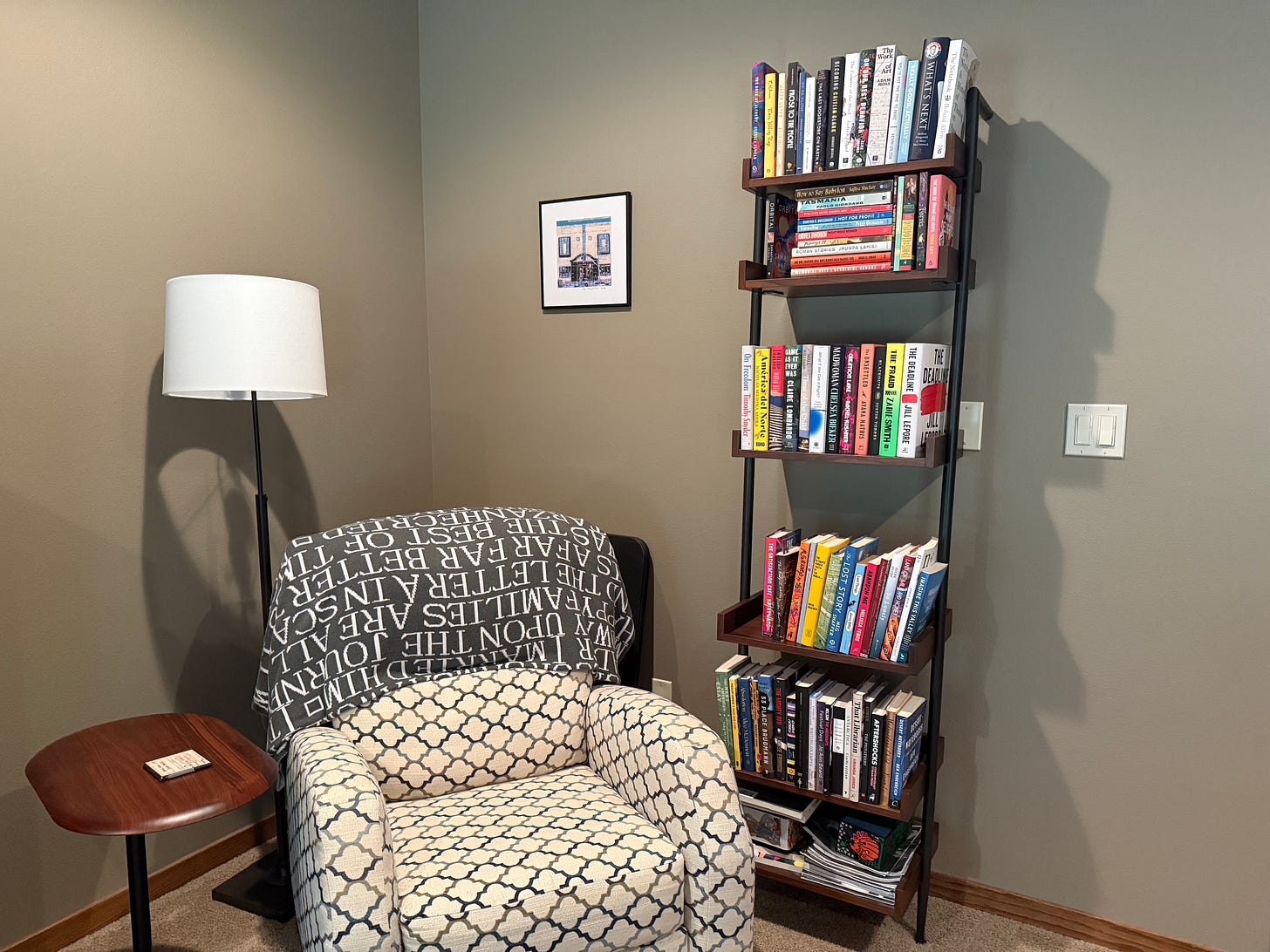I started three different essays for this week’s Substack. None of them came together. I try to write with honesty. I try to move toward hope. I try to find insight or at least borrow insight from the research literature or from others who are also trying to understand the world. But sometimes, I write myself in circles. I can’t make sense of the world.
It’s not that I’m trying to write about particularly difficult topics. The essays I started were about walking Annie in the rain this morning, having both of my adult kids home, welcoming the falling leaves and football games of fall. But those topics are never what the essay is about. If I’ve done my job, the essay is about something deeper.
This is what Vivian Gornick calls “the situation and the story.” The situation is what happened. I walked the dog, I watched College GameDay with the kids, the Hawkeyes found their passing game. But the story is what it all means - the emotional experience, the insight, perhaps even a touch of wisdom.
To get to the wisdom, Gornick says that writers create a truth teller - “the narrator that a writer pulls out of his or her own agitated or boring self to organize a piece of experience.” Throughout her book, Gornick gives us suggestions for writing both the situation and the story. She provides examples of writers who have found a “purposeful innerliness.” It is this self-investigation that allows writers to make sense of the complexity that underlies any given situation, and in this way, to connect with the reader.
Ultimately, I write to find the story for myself. I want to understand the world and my place in it. “Purposeful innerliness” is a goal that I never quite reach, but I will keep trying. It seems a worthy pursuit.
But this week, I couldn’t get to even the most obvious conclusion. Forget wisdom, I couldn’t find an inkling of an insight. What’s going on?
One theory is that wisdom cannot be commanded on a weekly schedule. Part of the reason that I started this Substack was to make writing a habit. I can put words on the page every week. But it is much harder to compel insight. I trust that if I show up and do the work, I’ll get there eventually. But that doesn’t mean that I’ll get there by 8:00 am every Sunday.
It’s also possible that my sensemaking muscle is depleted. So much in the world doesn’t make sense these days. I’ve used the phrase, “I can’t square the circle,” over and over this week. I firmly believe that I need to be aware of what’s going on in the world. I have a level of privilege that affords me the possibility of not paying attention, but if I am to be an effective teacher, mentor, mom, and friend, I can’t ignore what is affecting all of us. I have titrated my exposure to the news, staying away from social media and relying on dependable sources. After a small serving of reality, I find recovery by reading poetry, fiction, and most recently, the wonderful graphic memoir, Good Talk. This week, I overexerted my sensemaking muscle. Recovery is going to take a while.
But, if I’m being honest, which I promised to be in paragraph one, there is a small piece of me who has bigger goals for myself as a writer. James Baldwin suggests that writers go beyond making sense of the world:
"You write in order to change the world, knowing perfectly well that you probably can't but also knowing that literature is indispensable to the world. The world changes according to the way people see it, and if you alter, even by a millimeter, the way people look at reality, then you can change it."
So many writers have done this for me, showing me a perspective that is not my own. It’s been over a decade since I read Beyond the Beautiful Forevers, and I still think about the world of poverty and persistence in the slums near Mumbai that Katherine Boo opened up. A few weeks ago, I wrote about Arlie Russell Hochschild’s book, Stolen Pride. My friend Erin and I are still talking about the ways that book helped us see other people’s perspectives.
Taking another person’s perspective isn’t about debate or judgment. It is certainly not possible without seeing the person behind the perspective as a person of worth and dignity. When we deny someone’s humanity, not only are we unable to take their perspective, but we also encourage others to disregard their experience. Conversation is impossible when the space between two people is dripping with disdain.
I want to believe that when someone is willing to share their perspective with you, meeting them with good intent and an open mind can open a connection that might change how we see the world, even if only by a millimeter. But that connection is not fully determined by the two people in conversation with one another. The space between is colored by the cultural context as well. I want to believe that there is something that I can do, even if only in my small corner of the world, to promote connection. But I’m not sure that I can. The truth is that squaring a circle is mathematically impossible. Yet, I keep trying.


